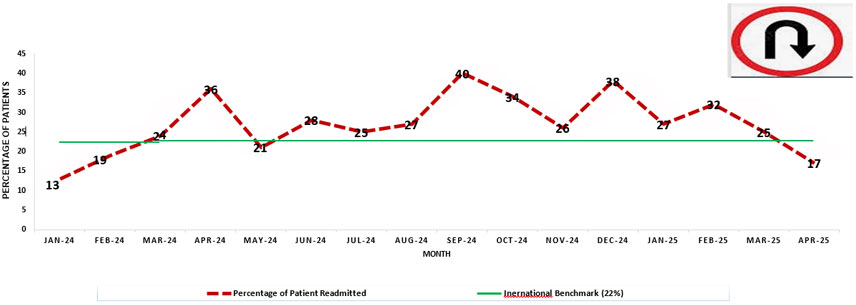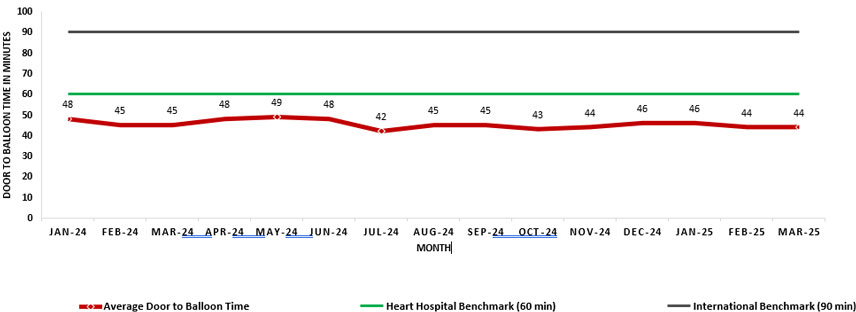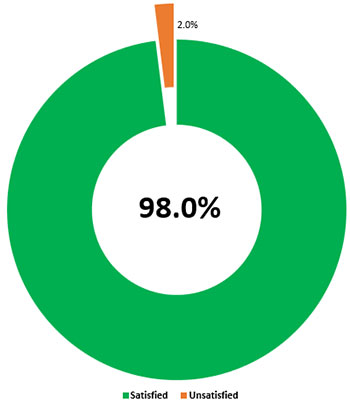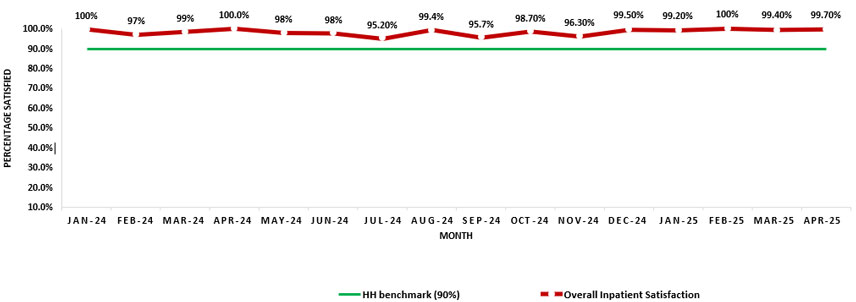Key Performance Indicators
Our Key Performance Indicators (KPIs) at Heart Hospital reflect our ongoing efforts to deliver safe, timely, and high-quality care. These measures help us monitor performance across clinical quality, operational efficiency, and patient experience, ensuring we meet the highest standards of excellence and remain responsive to the needs of our patients and their families.
Clinical Quality KPIs
These indicators assess our success in delivering evidence-based, high-quality clinical care:
30-Day Readmission Rate for Heart Failure
Percentage of patients diagnosed with heart failure who are readmitted within 30 days of discharge from Heart Hospital.
Heart failure, also known as congestive heart failure, is a condition that develops when your heart doesn’t pump enough blood for your body’s needs. The term “heart failure” does not mean that your heart has stopped. However, heart failure is a serious condition that needs medical care.
Your doctor diagnoses heart failure based on your medical and family history, a physical exam, and results from imaging and blood tests. Despite advances in treatment, heart failure is a leading cause of hospital readmissions. The main reason for readmission is non-adherence of patients to treatment plans and lifestyle modification.
Did you know that one out of every three patients admitted to Heart Hospital is treated for heart failure? Many of these patients also live with other health conditions like kidney disease and diabetes, making their care more complex and important.

Heart Failure 30-Day Readmission Rate
In 2024, 27.5% of heart failure patients at Heart Hospital were readmitted within 30 days of discharge. This figure increased slightly to 28% in early 2025, exceeding the international benchmark of 22% as reported by the U.S. Centers for Medicare & Medicaid Services (CMS). Reducing readmissions is a key priority, and we are actively implementing targeted interventions, including enhanced discharge planning, timely follow-up appointments, and patient education, to improve continuity of care and long-term outcomes.
Antibiotic Prophylaxis Compliance for CABG
Percentage of patients undergoing Coronary Artery Bypass Grafting (CABG) who received timely and appropriate antibiotic prophylaxis.
The CABG procedure is a longstanding and effective surgical approach to improve blood circulation in the heart. This surgery is necessary when the coronary arteries become blocked or narrowed. Antibiotic prophylaxis is important to prevent infection after CABG surgery. The duration and selecting appropriate antibiotic is important. Adherence to the guideline of appropriate antibiotic prophylaxis helps prevent surgical site infections and contributes to better patient outcomes.

Antibiotic Prophylaxis Compliance
Heart Hospital maintained high compliance with antibiotic prophylaxis, achieving 98% in 2023 and 97.8% in early 2024. These results closely approach our target of 100%, supporting safer surgical outcomes and effective infection prevention.
Efficiency KPIs
These metrics measure how effectively we manage resources and coordinate care delivery:
Post-Discharge Heart Failure Follow-Up
Percentage of heart failure patients seen at the Heart Failure Clinic within two weeks of discharge from Heart Hospital.
The transition from inpatient care to an ambulatory setting and the immediate post-hospitalization is a critical period for optimizing medical therapy, ensuring medication adherence, identifying reversible factors contributing to heart failure, and evaluating patient prognosis.
At Heart Hospital, we prioritize scheduling follow-up appointments for heart failure patients within two weeks of discharge. Timely access to the Heart Failure Clinic helps improve the quality of care, reduce the risk of readmission, and lower the overall cost of care delivery.

Timely Heart Failure Clinic Follow-Up
In 2024, 85% of heart failure patients were seen in the Heart Failure Clinic within two weeks of discharge. This figure rose slightly to 85.6% in early 2025.
While approaching our benchmark of 90%, the consistently high demand for follow-up appointments underscores the need to expand access and optimize clinical resources to ensure timely, high-quality post-discharge care.
Average Door-to-Balloon Time
Average time between a patient’s arrival at Heart Hospital and the initiation of percutaneous coronary intervention (PCI) for acute ST-segment elevation myocardial infarction (STEMI).
A heart attack, or myocardial infarction, occurs when the arteries supplying the heart become completely blocked or significantly narrowed due to a buildup of cholesterol and other substances. To restore normal blood flow to the heart muscle, an interventional cardiologist may perform a procedure called angioplasty. This is a minimally invasive procedure that does not involve major surgery. A thin tube, or catheter, is inserted through a small puncture in an artery in the leg or arm and guided toward the heart. At the site of the blockage, a small balloon attached to the catheter is inflated to remove the clot, widen the artery, and improve blood flow.
An important quality indicator in treating heart attacks is the “door-to-balloon” time. This refers to the time interval between a patient’s arrival at the emergency department and the moment the catheter guidewire crosses the blocked artery in the cardiac catheterization lab. Reducing this time is critical, as delays in treatment can result in more extensive damage to the heart muscle. Clinical guidelines recommend that the door-to-balloon time should not exceed 90 minutes.

Door-to-Balloon Time
At Heart Hospital, the average door-to-balloon time was 45 minutes in 2023 and improved slightly to 44.6 minutes in early 2025, significantly outperforming the international benchmark of 90 minutes. This achievement reflects our commitment to delivering rapid, life-saving treatment for heart attack patients and minimizing damage to the heart muscle.
Service Excellence KPIs
These indicators reflect our patients’ perceptions and satisfaction with the care they receive:
Overall Inpatient SatisfactionMeasures the overall satisfaction of patients admitted to Heart Hospital.
Your satisfaction with the care and service you receive during your inpatient stay is extremely important to us. We actively listen to feedback from our patients and their families to continuously improve the quality of care we provide. Our goal is to ensure you receive the best possible support throughout your inpatient journey. By measuring the percentage of patients who express satisfaction with their overall experience, we can identify both our strengths and areas where further improvement is needed. Your wellbeing and comfort remain at the core of everything we do.


Inpatient Satisfaction at Heart Hospital
Inpatient satisfaction at Heart Hospital remained high throughout 2024 and early 2025, consistently surpassing our 90% benchmark. This reflects the strong trust and appreciation our patients have in the care we provide.
Overall Outpatient Satisfaction
Measures the overall satisfaction of patients receiving care from Outpatient Department.
Meeting your expectations during every visit to our clinics is our top priority. By sharing your concerns and feedback, you help us recognize both our strengths and the areas where we can improve, ensuring you receive the highest quality care. Our team is committed to making your experience in the outpatient department as pleasant and efficient as possible. Your feedback guides our ongoing efforts to enhance our services and provide the exceptional care you deserve.

Outpatient Satisfaction at Heart Hospital
Outpatient satisfaction during clinic visits at Heart Hospital exceeded 90% in both 2024 and the first quarter of 2025. This performance surpasses our benchmark and underscores our dedication to delivering high-quality, person-centered care.
